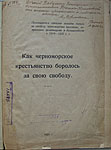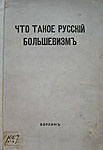Exhibition at the Plekhanov House
 N. Voronovich. How the Black Sea Peasants Fought for their Freedom: (Dedicated to the memory of freedom fighters, the Black Sea peasants, tormented to death by Denikin's forces /the White Army/ and the Bolsheviks in 1919 - 1920). S.L. 1921. 24 pp. (F. 1094. Op. 3. Item no. 40).
N. Voronovich. How the Black Sea Peasants Fought for their Freedom: (Dedicated to the memory of freedom fighters, the Black Sea peasants, tormented to death by Denikin's forces /the White Army/ and the Bolsheviks in 1919 - 1920). S.L. 1921. 24 pp. (F. 1094. Op. 3. Item no. 40).
The book was returned to the Plekhanov House from the Spetskhran (an abbreviation for "Special Storage Section") in 1991. The copy is imperfect - the cover is missing. On the front page there are the author's presentation inscription, 'To Dear Grandma Catherine Konstantinovna Breshko-Breshkovskaya from the author, genuinely respecting and loving her. N. Voronovich. Paris, 17 Feb. 1921.'
 V.M. Zenzinov. Homeless Children. Paris: Modern Notes, 1929. 325. (F. 1094. Op. 3. Item no. 46).
V.M. Zenzinov. Homeless Children. Paris: Modern Notes, 1929. 325. (F. 1094. Op. 3. Item no. 46).
The book was returned to the Plekhanov House from the Spetskhran (an abbreviation for "Special Storage Section") in 1991. The book has a presentation inscription , which reads, 'To the Institute after G.V.Plekhanov from the author. Paris, April 1930.'. Rosalie Markovna Plekhanova devoted the last 20 years of her life to making the Plekhanov House into a research institute for the study of the history of social thought and the labor movement. Plekhanov's collections presented by his widow to the NLR, together with archives of members, associates and adherents of the Emancipation of Labour group ( the first Russian Marxist group) were to be a corner stone for the new scientific department of the State Public Library (the former name for the NLR). Since the mid 1920s, the idea of establishment of such an institute was discussed widely both among the Russian political exiles living in Europe and America and those who remained in Soviet Russia. Vladimir Zenzinov (1880 - 1953) was a member of the Central Committee of the Socialist-Revolutionary Party (the SRs, or Esers). Living in exile, he worked for various Socialist-Revolutionary publishers. The author dedicated his book to street children in Russia during the revolution and civil war. In the preface to the book, he writes, 'Wishing by all means to avoid blame in an exaggeration or political tendency, the author uses only Soviet material. ... Throughout the book there is no fact or figure that would be taken not from the Soviet literature (emphasized by the author) ( except in a few specified cases): all dates and sources are accurately cited. Responsibility for all the following facts must be borne only by the Soviet authorities which today keep control of every printed word in Russia. And if, nevertheless, certain political conclusions can be made from the reported facts, it should indicate only that such are the characteristics and the significance of the facts themselves. "

 Leon Shestov. What is Bolshevism. Berlin, 1920. 38 pp. (F. 1094. Op. 3. Item no. 67).
Leon Shestov. What is Bolshevism. Berlin, 1920. 38 pp. (F. 1094. Op. 3. Item no. 67).
Leyb Schwartzman (Leon Shestov is a pen name) (1866 - 1938), the Russian existentialist philosopher and writer, who lived in Paris since 1920, presented this book to R.M. Plekhanov, as evident from the presentation inscription, 'To Rosalie Markovna Plekhanov, in good memory from the author '. The book, which gives a very negative description of the events occurring in Russia, ends with the words, 'In Russia, the very young and not so wise people confidently predicted that Bolshevism will spread throughout the world.' The book was returned to the Plekhanov House from the Spetskhran (an abbreviation for "Special Storage Section") in 1991.
 A.N.Potresov. In a Prison of Illusions: (my argument with the official Menshevism). Paris, 1927. 104 pp. (F. 1094. Op. 3. Item no. 85).
A.N.Potresov. In a Prison of Illusions: (my argument with the official Menshevism). Paris, 1927. 104 pp. (F. 1094. Op. 3. Item no. 85).
The book was also returned to the Plekhanov House from the Spetskhran (an abbreviation for "Special Storage Section") in 1990. It has the ownership inscription by R.M. Plekhanova. Alexander Potresov (1869 - 1934) was one of the founders of the Russian Social Democratic Labour Party, an ally of the Emancipation of Labour group ( the first Russian Marxist group), then one of the leaders of the Mensheviks. In 1925, he was permitted by the Soviet government to go abroad for treatment. Potresov settled in Paris, where he was engaged in writing and publishing. In the preface, the author writes, 'I am reappearing on the public stage "from the next world", and, after years of hibernation in captivity of the Bolsheviks and illness, I am once again "making my debut", - while I have over thirty years of writing and political experience behind myself! And "I am making my debut" by my argument with an official "majority "of my party - the Menshevik Social-Democrats. ... Returning from" the next world ", I am raising my voice in protest- in my own way - and reviving the old ideological struggle that I once carried against the party utopianism, and which - to my great regret - is still not over. "

 V.B. Stankevich. Memories. 1914 - 1919. Berlin: Ladyzhnikov publishing house, 1920. 356 pp.
V.B. Stankevich. Memories. 1914 - 1919. Berlin: Ladyzhnikov publishing house, 1920. 356 pp.
The book was returned to the Plekhanov House from the Spetskhran (an abbreviation for "Special Storage Section") in 1991. The front page bears the author's autograph, namely, a presentation inscription to an unidentified person. Vladimir Stankevich (1884 - 1969) was a lawyer, belonged to the People's Socialist Party. During the Second World War he was a front-line soldier, after the February Revolution was a member of the Executive Committee of Petrograd (the fomer name for Saint Petersburg), then was the Commissioner of the Provisional Government on the northern front. After the October revolution, Stankevich emigrated abroad.

 Victor Serge: Socialist Humanism against Totalitarianism: Proceedings of the Intern. Scient. Conf. 29 - 30 September 2001, Moscow: Research and Educational Cente "Praxis", 2003. 178 pp.
Victor Serge: Socialist Humanism against Totalitarianism: Proceedings of the Intern. Scient. Conf. 29 - 30 September 2001, Moscow: Research and Educational Cente "Praxis", 2003. 178 pp.
Victor Serge. From the Revolution to Totalitarianism: Memoirs of a Revolutionist: Trans. from French. Moscow; Orenburg: Research and Educational Cente "Praxis"; Orenburg book, 2001. 696 pp.
An anarchist agitator in Paris; a friend of guillotined "expropriators"; a prisoner of the French prison; an influential member of the Communist Party organizing the headquarters of the world revolution in the besieged Petrograd; an active worker for the Comintern promoting a revolt in Germany; and a member of the anti-Stalinist opposition party; a heretic, pursued by the State Political Directorate (the secret police); a political exile in Orenburg; an emigrant, forced to flee from Nazi-occupied France in Mexico ... All of this is born Victor Kibalchich (1890 - 1947), better known by the pen name Victor Serge, a public figure and noted Francophone writer and poet, whose works were appreciated by Romain Rolland, Andre Gide, George Orwell.
An international scientific conference held in Moscow in September 2001 and organized by the Scientific and Educational Centre "Praxis" with the assistance of the International Fund for Victor Serge (France), was assigned to coincide with the release of the From the Revolution to Totalitarianism: Memoirs of a Revolutionist in Russian. The reports of the participants from Russia, USA, Switzerland, examined some aspects of the ideological and political legacy of V. Serge, the most important among which is the issue of tracing of the history of revolutionary movements in the twentieth century. V. Serge's articles never published before in Russian, including The Power and Limits of Marxism, The Opposition in the USSR, Renewing Socialism, Thirty Years after the Russian Revolution, were printed in a supplement to the collection of the conference's proceedings.
In his memoirs, V. Serge not only narrates about the events in which he was involved, about the dramatic fate of the generation which chose the path of struggle to change the world at the beginning of the twentieth century, but also investigates the causes and significance of the events, gives psychological portraits of figures of the revolution. The publication has a detailed index of names quoted in book.
